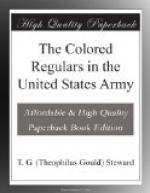The afternoon of the 12th the regiment advanced several hundred yards to the front and dug more intrenchments. They were still on this work the afternoon of the 14th when it was announced that the Spanish army had agreed to surrender. This came none too soon, for our men were coming down with malarial fever. A few days later nearly half the regiment were on the sick list, and the balance could not have done much.
The regiment was moved the same afternoon to higher ground in rear of the trenches. Strong guards were kept to look out for our prisoners and to prevent “our allies,” the Cubans, from going into the city.
On the morning of the
17th the formal surrender of the city
and Spanish army took
place. We were some distance away and
did not see anything
of the ceremony.
On July 25th the regiment was moved about a mile further back in the hills and made camp, our tents, etc., having been brought up from the transport. Medicines appeared very scarce, resulting in much suffering. The food supplied was totally unfit for our new surroundings, and I believe not a little of the sickness can be traced to this. Our last camp was as good as any to be found in that vicinity.
The regiment remained
in camp until August 13th, when it
embarked on the transport
“Camanche” for Montauk Point,
arriving on the 18th,
and landed on the 23d.
B.H.R. LOUGHBOROUGH,
Captain, 25th Infantry.
FOOTNOTES:
[18] First Lieutenant McCorkle killed; Captain Edwards and First Lieutenants Kinnison and Murdock wounded.
CHAPTER VII.
SAN JUAN.
Cavalry Division: The Ninth and Tenth Regiments.
When Lawton’s division swung off to the right to engage the enemy at El Caney, with the results described in the preceeding chapter, the divisions of Wheeler and Kent were ordered to proceed directly along the Santiago road toward San Juan. Within a mile from El Pozo, the point where they had bivouacked for the night of the 30th, the troops arrived at the Aguadores River, which crosses the road here within less than a mile from San Juan Heights. Wheeler’s division headed the column, although that general was not commanding. He had been relieved on the afternoon of the 30th and did not resume command until about 4 o’clock on July 1,[19] long after the heights had been carried, although he was on the field shortly after 1 o’clock of that day.




